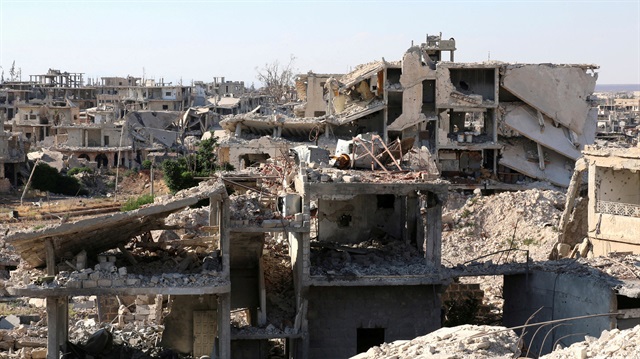
The United States is prepared to discuss with Russia joint efforts to stabilize war-torn Syria, including no-fly zones, U.S. Secretary of State Rex Tillerson said on Wednesday.
He added the United States wanted to discuss with Russia the use of on-the-ground ceasefire observers and the coordinated delivery of humanitarian aid to Syrians.
"If our two countries work together to establish stability on the ground, it will lay a foundation for progress on the settlement of Syria's political future," Tillerson said in a statement ahead of this week's Group of 20 summit in Germany.
The statement made no mention of Syrian President Bashar al-Assad's future. The United States largely blames Assad for the six years of civil war and has called on him to step down.
Tillerson also said Russia had an obligation to prevent the use of chemical weapons by Assad's regime.
Washington hit a Syrian air base with a missile strike in April after accusing the Assad regime of killing dozens of civilians in a chemical attack. Syria denied it carried out the attack.
U.S. President Donald Trump and Russian President Vladimir Putin are expected to meet on the sidelines of the G20 summit in Hamburg this week, and Tillerson said Syria would be a topic of discussion.
Russia is Assad's major ally and Moscow's military support has helped the Syrian regime turn the tide in a war against Daesh.
As the fight against Daesh winds down, Tillerson said Russia has a "special responsibility" to ensure Syria's stability.
He said Moscow needs to make sure no faction in Syria "illegitimately re-takes or occupies areas" liberated from Daesh or other groups.
U.S.-backed forces have surrounded Daesh's stronghold in Syria, the city of Raqqa.
Tillerson lauded U.S. and Russia cooperation in establishing de-confliction zones in Syria and said it was evidence "that our two nations are capable of further progress."
Speaking before he left Washington for Hamburg, Tillerson said:
"I think the important aspect of this is that this is where we've begun an effort to begin to rebuild confidence between ourselves and Russia at the military-to-military level but also at the diplomatic level."
In March, Tillerson said the United States would set up "interim zones of stability" to help refugees return home in the next phase of the fight against Daesh and al Qaeda in Syria and Iraq.
Charles Lister of the Middle East Institute think-tank in Washington cautioned against a U.S. approach in Syria that relied on Russia.
"Russia is neither capable nor willing to give us what we want in Syria," Lister said.
"Time and time again, the Obama administration placed its hopes in Russia as the sole guarantor of de-escalation, humanitarian aid and political progress, and time and time again the Obama administration was left disappointed," he said. "Why do we think this time will be any different?"
Trump came into office in January seeking to improve ties with Russia that had soured during the Obama administration. But Trump is under pressure at home to take a hard line with Putin due to allegations that Russians meddled in the U.S. election and of possible collusion between the Trump campaign and Russia.
Hello, the comments you share on our site are a valuable resource for other users. Please respect other users and different opinions. Do not use rude, offensive, derogatory, or discriminatory language.
The floor is all yours.









